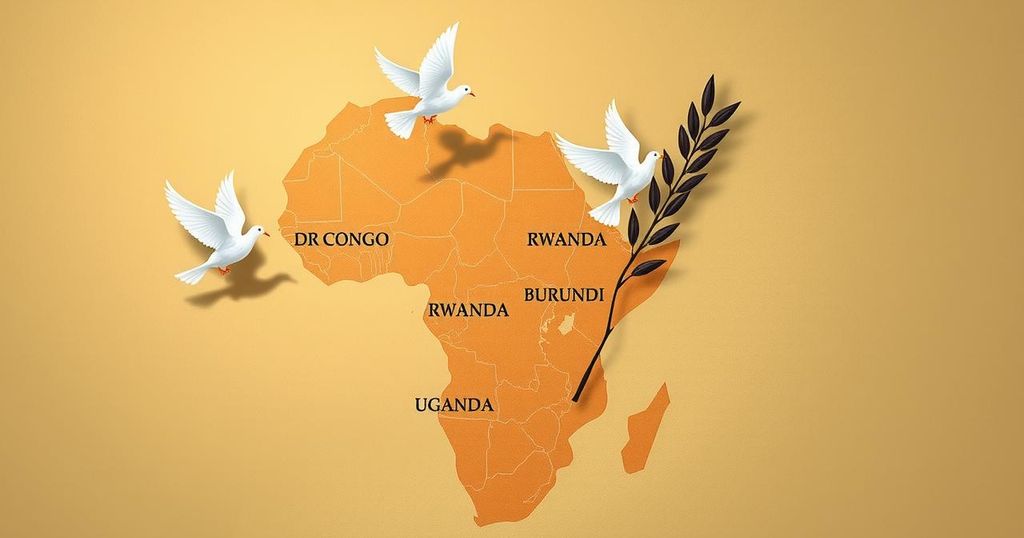Regional Dynamics in the Democratic Republic of Congo Crisis: Rwanda, Burundi, and Uganda’s Roles

The DRC crisis, stemming from M23’s territorial gains, involves regional powers like Rwanda, Burundi, and Uganda. Congolese President Tshisekedi accuses Rwanda of supporting M23 rebels, while Kagame frames the conflict as a defense of national security. Burundi seeks to thwart Rwandan influence, and Uganda plays a dual role in combating local threats. South Africa contends with diplomatic tensions, complicating the regional dynamics. The situation poses risks of broader conflict in Eastern Africa.
The ongoing crisis in the Democratic Republic of Congo (DRC) has intensified with M23 rebels claiming significant territory in the mineral-rich eastern region. This has led to a humanitarian and diplomatic emergency, drawing the involvement of several neighboring nations. The DRC’s expansive size complicates the conflict, which has a history of external influences and tensions. The East and Southern African regional blocs are convening an emergency summit to address the deteriorating situation.
Central to this conflict is Congolese President Félix Tshisekedi, who aims to recover territories occupied by M23, notably Goma. He accuses Rwandan President Paul Kagame of providing material support to the rebels, alleging an invasion intended to exploit mineral resources and disrupt his administration. Despite international acknowledgment of Rwanda’s involvement based on UN reports, calls for direct action or sanctions against Kigali have yet to be realized.
President Kagame, often at the focus of attention, skillfully navigates the conflict narrative. Rwanda denies providing military backing to M23 but insists on its right to defend against threats from Hutu factions responsible for the 1994 genocide. Kagame seeks to portray the situation as a DRC issue while pressing Kinshasa to engage with M23 directly, reflecting Rwanda’s interest in maintaining influence in eastern DRC and access to valuable resources.
Burundi plays a watchful role in this crisis, having deployed troops to combat internal rebels, while also siding with the Congolese army against M23. Tensions between Rwanda and Burundi complicate the situation, with each nation wary of the other’s military intentions. Burundian President Evariste Ndayishimiye has warned against Rwandan advancement, framing the ensuing conflict as a threat to his regime’s stability.
Uganda’s involvement adds another layer, as it assists the DRC in battling local militants affiliated with the Islamic State. Nonetheless, Uganda’s loyalties appear ambiguous, as there are claims of tacit support for M23. This dual role allows Uganda to pursue economic interests while contending with Rwandan influences in the region, aiming to retain its authority in eastern DRC.
South Africa’s contribution of troops under the Southern African Development Community is significant, yet it has also faced diplomatic strife with Rwanda following the deaths of its soldiers. The exchange between South African and Rwandan leaders shows a deepening rift, revealing differing approaches to the conflict. The East African Community favors negotiations with M23, while the Southern Africa bloc backs Congolese sovereignty and integrity.
This situation raises fears of a broader regional conflict reminiscent of the devastating wars of the late 1990s. Each nation’s involvement highlights distinct motivations, from securing territorial integrity to economic benefits, while the potential for expanded conflict remains a pressing concern.
The Democratic Republic of Congo (DRC) has been engulfed in a crisis primarily driven by the actions of M23 rebels who have seized critical territories in the eastern region. The conflict has a historical precedent of external influences from neighboring nations, complicating the internal socio-political dynamics. With its substantial size, the DRC’s geopolitical significance attracts the interest of surrounding countries, further escalating tensions amid humanitarian crises. The involvement of regional powers reflects a complex interplay of security interests and territorial disputes, necessitating diplomatic engagements and interventions.
The crisis in the Democratic Republic of Congo illustrates the complex interplay of regional influences involving Rwanda, Burundi, Uganda, and South Africa. Each nation has distinct motivations, ranging from security concerns to economic interests, which shape their involvement. The diplomatic responses and military actions taken by these countries not only impact the DRC but hold the potential to escalate conflicts across the broader region, reaffirming the need for a coordinated international effort to address these tensions.
Original Source: www.bbc.com








